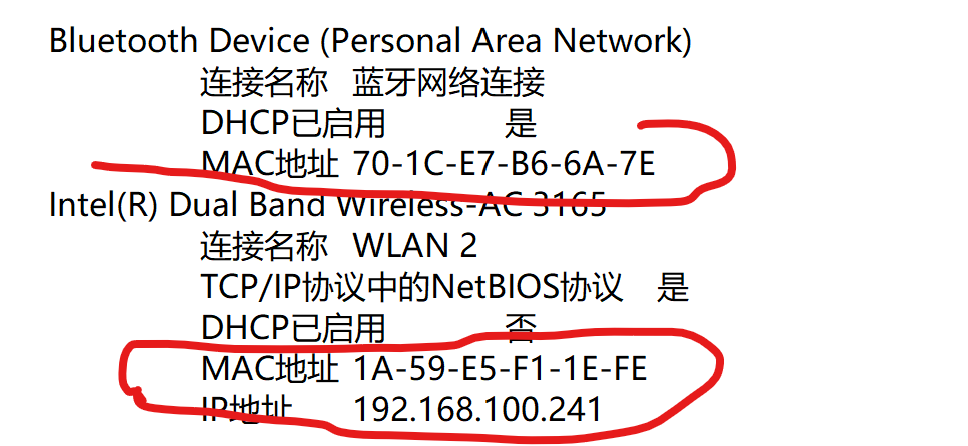一、序
在一些情况下,导出txt的配置信息,但是又有特定的规律。在这种情况下读取配置
二、问题分析
我们首先肯定是通过关键字定位文本位置,但txt文件我们会面临两种情况:
1.关键字与文本在同一行
2.关键字与文本不在同一行
3.判断条件
例如MAC地址只有有IP的才读取,没有IP的就不读取
三、解决思路
1.关键字与文本在同一行情况
def sameLine(txt_Path, needWord):
with open(txt_Path, "r") as file:
words = needWord
returnWord = []
for line in file.readlines():
if line.strip().startswith(words):
returnWord.append(line.strip().replace(words, ""))
if len(returnWord) == 0:
returnWord.append("无")
return returnWord
</code></pre>
2.关键字与文本不在同一行情况
# 得到指定关键字行数
def readTxtResult(txt_Path, needWord):
with open(txt_Path, "r") as file:
row = []
words = needWord
for i, line in enumerate(file.readlines(), start=1):
if words in line.strip():
b: int = i
row.append(b)
else:
var = ()
return row
# 得到指定一行的文本
def getRowWord(txt_Path, row):
with open(txt_Path, "r") as file:
lines = file.readlines()
word = lines[row].strip()
return word
</code></pre>
- 如果是有判断条件,先去需要的地方获取判断条件,自定义判断条件
3.总代码
import os.path
import re
def extract_chinese(text):
if '0' in text:
text = text.strip('0')
pattern = re.compile(r'[\u4e00-\u9fa5]+')
result = pattern.findall(text)
return ''.join(result)
def listToStr(strList):
strs = ""
if len(strList) > 0:
for i in strList:
strs = strs + i
if i != strList[-1]:
strs = strs + "\\"
return strs
def returnNo(txt_Path):
# 获取部门
parent_dir = os.path.dirname(txt_Path)
dep = os.path.basename(parent_dir)
if '0' in dep:
dep = dep.strip('0')
# 获取编号
name = os.path.basename(txt_Path)
name = name.replace('.txt', '')
userNo: str = re.sub('[\u4e00-\u9fa5]', '', name)
name = extract_chinese(name)
return dep, userNo, name
# 得到指定关键字行数
def readTxtResult(txt_Path, needWord):
with open(txt_Path, "r") as file:
row = []
words = needWord
for i, line in enumerate(file.readlines(), start=1):
if words in line.strip():
b: int = i
row.append(b)
else:
var = ()
return row
def sameLine(txt_Path, needWord):
with open(txt_Path, "r") as file:
words = needWord
returnWord = []
for line in file.readlines():
if line.strip().startswith(words):
returnWord.append(line.strip().replace(words, ""))
if len(returnWord) == 0:
returnWord.append("无")
return returnWord
# 得到指定一行的文本
def getRowWord(txt_Path, row):
with open(txt_Path, "r") as file:
lines = file.readlines()
word = lines[row].strip()
return word
def if_SSD(word):
if "SSD" in word:
return "(SSD)"
else:
return "(SATA)"
def toGBorDB(lists):
for i in range(0, len(lists)):
num_str = lists[i].strip("字节")
lists[i] = num_str.strip("\t")
numtoTB = lists[i]
conunt_str = lists[i].count(",")
if conunt_str >= 4:
lists[i] = ''.join(numtoTB.split())[:-16].upper() + 'TB'
elif conunt_str == 3:
lists[i] = ''.join(numtoTB.split())[:-12].upper() + 'GB'
return lists
def readAll(txt_Path):
try:
readList = [returnNo(txt_Path)[0], returnNo(txt_Path)[1]]
PcType = sameLine(txt_Path, "电脑类型:")[0]
readList.append(PcType.strip(" "))
row_OS = readTxtResult(txt_Path, "操作系统")
Pc_OS = getRowWord(txt_Path, row_OS[0])
readList.append(Pc_OS)
row_MAC = readTxtResult(txt_Path, "MAC地址")
Pc_MAC_list = []
Pc_IP_list = []
if len(row_MAC) > 0:
for i in row_MAC:
if 'IP地址' in getRowWord(txt_Path, i):
Pc_MAC = getRowWord(txt_Path, i - 1).strip('MAC地址')
Pc_MAC_list.append(str(Pc_MAC).strip("\t"))
Pc_IP = getRowWord(txt_Path, i).strip("IP地址")
Pc_IP_list.append(Pc_IP.strip('\t'))
# 判断是否上网
if len(Pc_IP_list) > 0:
PC_Net = "是"
else:
PC_Net = "否"
readList.append(listToStr(Pc_IP_list))
readList.append(listToStr(Pc_MAC_list))
Pc_CPU = sameLine(txt_Path, "规格")
row_RAM = readTxtResult(txt_Path, "RAM")
Pc_RAM = getRowWord(txt_Path, row_RAM[0]).split('GB', 1)[0] + "GB"
Pc_SSD = sameLine(txt_Path, "真实大小")
Pc_SSD = toGBorDB(Pc_SSD)
SSD_Num = len(Pc_SSD)
row_SSD = readTxtResult(txt_Path, "存储器")[0]
Pc_SSDType = []
for i in range(0, SSD_Num):
Pc_SSDType.append(if_SSD(getRowWord(txt_Path, row_SSD)))
Pc_allSSD = f"{Pc_SSD[0]}" + f"{Pc_SSDType[0]}"
if SSD_Num > 1:
for i in range(1, SSD_Num):
Pc_allSSD = Pc_allSSD + f"+{Pc_SSD[i]}" + f"{Pc_SSDType[i]}"
Pc_allSSD = Pc_CPU[0].strip("\t") + "\n" + Pc_RAM + "\n" + Pc_allSSD
readList.append(Pc_allSSD)
readList.append(PC_Net)
readList.append(returnNo(txt_Path)[2])
return readList
except Exception as e:
print(e)
if __name__ == '__main__':
# r不用管\ ,f可以使用变量
path = r"测试.txt"


